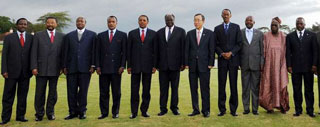
By Independent Team & Agencies
Suruma prays to God as Davos delegates tackle worst slump
Global economic growth in 2009 is expected to fall to 0.5% when measured in terms of purchasing power parity and to turn negative when measured in terms of market exchange rates.
That verdict is contained in the latest World Economic Outlook update released on January 28 by the International Monetary Fund (IMF) under the ominous sub-title: “Global slump challenges policies”.
According to reports from Davos, Switzerland, where 2,500 of the world riches people and economic minds met last week, the IMF report contributed to the “mood of black pessimism”. The World Economic Forum is an annual event for mapping out the economic forecast for the year. This year it was held under the theme: “Shaping the post-crisis world”.
Multi-millionaire, Rupert Murdoch is quoted to have said that in the last 12 months, up US$50 trillion has been lost in investments by private individuals “” and it’s still getting worse.
The IMF report was released just a day to the opening of Uganda’s national consultative budget workshop at the Imperial Royale Hotel in Kampala on January 29 and 30.
Addressing participants to the Kampala meeting, who included held ministers, MPs, LC V chairmen, and donors, Finance Minister Ezra Suruma said although Uganda would not receive a direct hit, it was not immune to the global economic slump. He said Uganda’s economy is “almost certain to slow down”.
“But we hope, with the help of God and with patience and perseverance to continue to grow as the world economy picks up once again,” he said.
Statisticians at Makerere University in Kampala estimate that the likelihood of Uganda being hit by the global crisis has increased from 0 in 2008 to 0.4% today.
The so-called vulnerability index puts Kenya at 0.4%, Rwanda at 1.4% and Burundi at 0.8%.
The IMF report said efforts to ease credit strains as well as expansionary fiscal and monetary policies, could help the global economy experience a gradual recovery by 2010.At this point growth will pick up to 3 percent.
However, the outlook is highly uncertain, and the timing and pace of the recovery depend critically on strong policy actions, the report says.
The update says the fall in growth is the lowest rate since World War II about 60 years ago.
It represents a downward revision of about 2 percentage points from the November 2008 Update.
“Despite wide-ranging policy actions, financial strains remain acute, pulling down the real economy,” the report says, “A sustained economic recovery will not be possible until the financial sector’s functionality is restored and credit markets are unclogged.”
According to the report, new policy initiatives are needed to produce credible loan loss recognition; sort financial companies according to their medium-run viability; and provide public support to viable institutions by injecting capital and carving out bad assets.
It recommends that monetary and fiscal policies become even more supportive of aggregate demand and sustain this stance over the foreseeable future, while developing strategies to ensure long-term fiscal sustainability. Moreover, international cooperation will be critical in designing and implementing these policies.
According to the IMF’s latest projections, the advanced economies and the newly industrialized Asian economies would take the biggest hit and experience a slower recovery than the poorer economies in Africa and China, and India.
In a rare event, the attendees from the rich nations paid attention to advice from a Finance minister of an African country, Mr Trevor Manuel of South Africa.
Mr Manuel warned the rich nations against hurried monetary and fiscal stimulus.
“Everybody wants to get to the precipice first without any idea what the money is going to buy. Fiscal stimulus is very fashionable but I can’t for the life of me understand what $10bn poured into `Detroit-3″ is going to do for the real economy,” he said.
The week before, World Bank President Robert Zoellick had appealed for a global “Vulnerability Fund” for poor countries to be included in the stimulus packages of wealthier nations. He noted that the economic crisis has “already pushed an estimated 100 million people back into poverty”, according to The Telegraph newspaper in the UK.
“It will be important to avoid cutbacks in foreign aid in response to tightening budget constraints, lest hard-won economic gains in developing countries are lost,” the IMF warned.
 The Independent Uganda: You get the Truth we Pay the Price
The Independent Uganda: You get the Truth we Pay the Price


